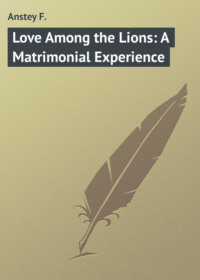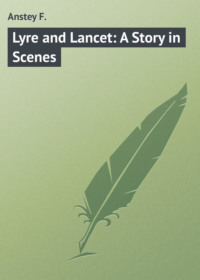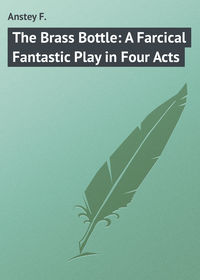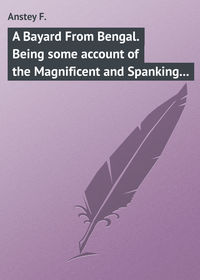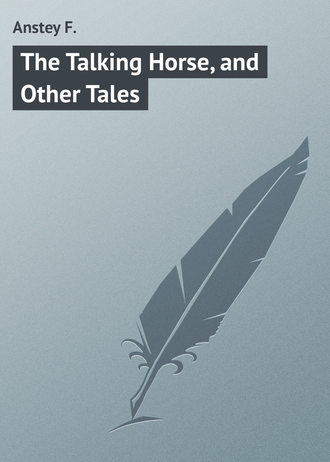 полная версия
полная версияThe Talking Horse, and Other Tales
'Yes – yes,' I said; 'but you never told me what became of the horse.'
'Ah! the horse – yes. I am looking for him. I'm not so angry with him as I was, and I don't like to ask too many questions at the stables, for fear they may tell me one day that they had to shoot him while I was so ill. You knew I was ill, I dare say?' he broke off: 'there were bulletins about me in the papers. Look here.'
He handed me a cutting on which I read:
'The Recent Accident in Rotten Row. – There is no change as yet in Mr. Pulvertoft's condition. The unfortunate gentleman is still lying unconscious at his rooms in Park Street; and his medical attendants fear that, even if he recovers his physical strength, the brain will be permanently injured.'
'But that was all nonsense!' said Mr. Pulvertoft, with a little nervous laugh, 'it wasn't injured a bit, or how could I remember everything so clearly as I do, you know?'
And this was an argument that was, of course, unanswerable.
THE GOOD LITTLE GIRL
A STORY FOR CHILDREN
Her name was Priscilla Prodgers, and she was a very good little girl indeed. So good was she, in fact, that she could not help being aware of it herself, and that is a stage to which very many quite excellent persons never succeed in attaining. She was only just a child, it is true, but she had read a great many beautiful story-books, and so she knew what a powerful reforming influence a childish and innocent remark, or a youthful example, or a happy combination of both, can exert over grown-up people. And early in life – she was but eleven at the date of this history – early in life she had seen clearly that her mission was to reform her family and relatives generally. This was a heavy task for one so young, particularly in Priscilla's case, for, besides a father, mother, brother, and sister, in whom she could not but discern many and serious failings, she possessed an aunt who was addicted to insincerity, two female cousins whose selfishness and unamiability were painful to witness, and a male cousin who talked slang and was so worldly that he habitually went about in yellow boots! Nevertheless Priscilla did not flinch, although, for some reason, her earnest and unremitting efforts had hitherto failed to produce any deep impression. At times she thought this was owing to the fact that she tried to reform all her family together, and that her best plan would be to take each one separately, and devote her whole energies to improving that person alone. But then she never could make up her mind which member of the family to begin with. It is small wonder that she often felt a little disheartened, but even that was a cheering symptom, for in the books it is generally just when the little heroine becomes most discouraged that the seemingly impenitent relative exhibits the first sign of softening.
So Priscilla persevered: sometimes with merely a shocked glance of disapproval, which she had practised before the looking-glass until she could do it perfectly; sometimes with some tender, tactful little hint. 'Don't you think, dear papa,' she would say softly, on a Sunday morning, 'don't you think you could write your newspaper article on some other day – is it a work of real necessity?' Or she would ask her mother, who was certainly fond of wearing pretty things. 'How much bread for poor starving people would the price of your new bonnet buy, mother? I should so like to work it out on my little slate!'
Then she would remind her brother Alick that it would be so much better if, instead of wasting his time in playing with silly little tin soldiers, he would try to learn as much as he could before he was sent to school; while she was never tired of quoting to her sister Betty the line, 'Be good, sweet maid, and let who will be clever!' which Betty, quite unjustly, interpreted to mean that Priscilla thought but poorly of her sister's intellectual capacity. Once when, as a great treat, the children were allowed to read 'Ivanhoe' aloud, Priscilla declined to participate until she had conscientiously read up the whole Norman period in her English history; and on another occasion she cried bitterly on hearing that her mother had arranged for them to learn dancing, and even endured bread and water for an entire day rather than consent to acquire an accomplishment which she feared, from what she had read, would prove a snare. On the second day – well, there was roast beef and Yorkshire pudding for dinner, and Priscilla yielded; but she made the resolution – and kept it too – that, if she went to the dancing class, she would firmly refuse to take the slightest pains to learn a single step.
I only mention all these traits to show that Priscilla really was an unusually good child, which makes it the more sad and strange that her family should have profited so little by her example. She was neither loved nor respected as she ought to have been, I am grieved to say. Her papa, when he was not angry, made the cruellest fun of her mild reproofs; her mother continued to spend money on dresses and bonnets, and even allowed the maid to say that her mistress was 'not at home,' when she was merely unwilling to receive visitors. Alick and Betty, too, only grew more exasperated when Priscilla urged them to keep their tempers, and altogether she could not help feeling how wasted and thrown away she was in such a circle.
But she never quite lost heart; her papa was a literary man and wrote tales, some of which she feared were not as true as they affected to be, while he invariably neglected to insert a moral in any of them; frequently she dropped little remarks before him with apparent carelessness, in the hope that he might put them in print – but he never did; she never could recognise herself as a character in any of his stories, and so at last she gave up reading them at all!
But one morning she came more near to giving up in utter despair than ever before. Only the previous day she had been so hopeful! her father had really seemed to be beginning to appreciate his little daughter, and had presented her with sixpence in the new coinage to put in her money-box. This had emboldened her to such a degree that, happening on the following morning to hear him ejaculate 'Confound it!' she had, pressing one hand to her beating heart and laying the other hand softly upon his shoulder (which is the proper attitude on these occasions), reminded him that such an expression was scarcely less reprehensible than actual bad language. Upon which her hard-hearted papa had told her, almost sharply, 'not to be a little prig!'
Priscilla forgave him, of course, and freely, because he was her father and it was her duty to bear with him; but she felt the injustice deeply, for all that. Then, when she went up into the nursery, Alick and Betty made a frantic uproar, merely because she insisted on teaching them the moves in chess, when they perversely wanted to play Halma! So, feeling baffled and sick at heart, she had put on her hat and run out all alone to a quiet lane near her home, where she could soothe her troubled mind by thinking over the ingratitude and lack of appreciation with which her efforts were met.
She had not gone very far up the lane when she saw, seated on a bench, a bent old woman in a poke-bonnet with a crutch-handled stick in her hands, and this old woman Priscilla (who was very quick of observation) instantly guessed to be a fairy – in which, as it fell out, she was perfectly right.
'Good day, my pretty child!' croaked the old dame.
'Good-day to you, ma'am!' answered Priscilla politely (for she knew that it was not only right but prudent to be civil to fairies, particularly when they take the form of old women). 'But, if you please, you mustn't call me pretty – because I am not. At least,' she added, for she prided herself upon her truthfulness, 'not exactly pretty. And I should hate to be always thinking about my looks, like poor Milly – she's our housemaid, you know – and I so often have to tell her that she did not make her own face.'
'I don't alarm you, I see,' said the old crone; 'but possibly you're not aware that you're talking to a fairy?'
'Oh, yes, I am – but I'm not a bit afraid, because, you see, fairies can only hurt bad children.'
'Ah, and you're a good little child – that's not difficult to see!'
'They don't see it at home!' said Priscilla, with a sad little sigh, 'or they would listen more when I tell them of things they oughtn't to do.'
'And what things do they do that they oughtn't to, my child – if you don't mind telling me?'
'Oh, I don't mind in the least!' Priscilla hastened to assure her; and then she told the old woman all her family's faults, and the trial it was to bear with them and go on trying to induce them to mend their ways. 'And papa is getting worse than ever,' she concluded dolefully; 'only fancy, this very morning he called me a little prig!'
'Tut, tut!' said the fairy sympathetically, 'deary, deary me! So he called you that, did he? – "a little prig"! And you, too! Ah, the world's coming to a pretty pass! I suppose, now, your papa and the rest of them have got it into their heads that you are too young and too inexperienced to set up as their adviser – is that it?'
'I'm afraid so,' admitted Priscilla; 'but we mustn't blame them,' she added gently, 'we must remember that they don't know any better – mustn't we, ma'am?'
'You sweet child!' said the old lady with enthusiasm; 'I must see if I can't do something to help you, though I'm not the fairy I used to be – still, there are tricks I can manage still, if I'm put to it. What you want is something that will prove to them that they ought to pay more attention to you, eh? – something there can be no possible mistake about?'
'Yes!' cried Priscilla eagerly, 'and – and – how would it be if you changed them into something else, just to show them, and then I could ask for them to be transformed back again, you know?'
'What an ingenious little thing you are!' exclaimed the fairy; 'but, let us see – if you came home and found your cruel papa doing duty as the family hatstand, or strutting about as a Cochin China fowl – '
'Oh, yes; and I'd feed him every day, till he was sorry!' interrupted the warmhearted little girl impulsively.
'Ah, but you're so hasty, my dear. Who would write all the clever articles and tales to earn bread and meat for you all? – fowls can't use a pen. No, we must find a prettier trick than that – there was one I seem to remember, long, long ago, performing for a good little ill-used girl, just like you, my dearie, just like you! Now what was it? some gift I gave her whenever she opened her lips – '
'Why, I remember – how funny that you should have forgotten! Whenever she opened her lips, roses, and diamonds, and rubies fell out. That would be the very thing! Then they'd have to attend to me! Oh, do be a kind old fairy and give me a gift like that – do, do!'
'Now, don't be so impetuous! You forget that this is not the time of year for roses, and, as for jewels, well, I don't think I can be very far wrong in supposing that you open your lips pretty frequently in the course of the day?'
'Alick does call me a "mag,"' said Priscilla; 'but that's wrong, because I never speak without having something to say. I don't think people ought to – it may do so much harm; mayn't it?'
'Undoubtedly. But, anyhow, if we made it every time you opened your lips, you would soon ruin me in precious stones, that's plain! No, I think we had better say that the jewels shall only drop when you are saying something you wish to be particularly improving – how will that do?'
'Very nicely indeed, ma'am, thank you,' said Priscilla, 'because, you see, it comes to just the same thing.'
'Ah, well, try to be as economical of your good things as you can – remember that in these hard times a poor old fairy's riches are not as inexhaustible as they used to be.'
'And jewels really will drop out?'
'Whenever they are wanted to "point a moral and adorn a tale,"' said the old woman (who, for a fairy, was particularly well-read). 'There, run along home, do, and scatter your pearls before your relations.'
It need scarcely be said that Priscilla was only too willing to obey; she ran all the way home with a light heart, eager to exhibit her wonderful gift. 'How surprised they will be!' she was thinking. 'If it had been Betty, instead of me, I suppose she would have come back talking toads! It would have been a good lesson for her – but still, toads are nasty things, and it would have been rather unpleasant for the rest of us. I think I won't tell Betty where I met the fairy.'
She came in and took her place demurely at the family luncheon, which was the children's dinner; they were all seated already, including her father, who had got through most of his writing in the course of the morning.
'Now make haste and eat your dinner, Priscilla,' said her mother, 'or it will be quite cold.'
'I always let it get a little cold, mother,' replied the good little girl, 'so that I mayn't come to think too much about eating, you know.'
As she uttered this remark, she felt a jewel producing itself in some mysterious way from the tip of her tongue, and saw it fall with a clatter into her plate. 'I'll pretend not to notice anything,' she thought.
'Hullo!' exclaimed Alick, pausing in the act of mastication, 'I say —Prissie!'
'If you ask mother, I'm sure she will tell you that it is most ill-mannered to speak with your mouth full,' said Priscilla, her speech greatly impeded by an immense emerald.
'I like that!' exclaimed her rude brother; 'who's speaking with their mouth full now?'
'"Their" is not grammar, dear,' was Priscilla's only reply to this taunt, as she delicately ejected a pearl, 'you should say her mouth full.' For Priscilla's grammar was as good as her principles.
'But really, Priscilla, dear,' said her mother, who felt some embarrassment at so novel an experience as being obliged to find fault with her little daughter, 'you should not eat sweets just before dinner, and – and couldn't you get rid of them in some other manner?'
'Sweets!' cried Priscilla, considerably annoyed at being so misunderstood, 'they are not sweets, mother. Look!' And she offered to submit one for inspection.
'If I may venture to express an opinion,' observed her father, 'I would rather that a child of mine should suck sweets than coloured beads, and in either case I object to having them prominently forced upon my notice at meal-times. But I daresay I'm wrong. I generally am.'
'Papa is quite right, dear,' said her mother, 'it is such a dangerous habit – suppose you were to swallow one, you know! Put them in the fire, like a good girl, and go on with your dinner.'
Priscilla rose without a word, her cheeks crimsoning, and dropped the pearl, ruby, and emerald, with great accuracy, into the very centre of the fire. This done, she returned to her seat, and went on with her dinner in silence, though her feelings prevented her from eating very much.
'If they choose to think my pearls are only beads, or jujubes, or acidulated drops,' she said to herself, bitterly, 'I won't waste any more on them, that's all! I won't open my lips again, except to say quite ordinary things – so there!'
If Priscilla had not been such a very good little girl, you might almost have thought she was in a temper; but she was not; her feelings were wounded, that was all, which is quite a different thing.
That afternoon, her aunt Margarine, Mrs. Hoyle, came to call. She was the aunt whom we have already mentioned as being given to insincerity; she was not well off, and had a tendency to flatter people; but Priscilla was fond of her notwithstanding, and she had never detected her in any insincerity towards herself. She was sent into the drawing-room to entertain her aunt until her mother was ready to come down, and her aunt, as usual, overwhelmed her with affectionate admiration. 'How pretty and well you are looking, my pet!' she began, 'and oh, what a beautiful frock you have on!'
'The little silkworms wore it before I did, aunt,' said Priscilla, modestly.
'How sweet of you to say so! But they never looked half so well in it, I'll be bou – Why, my child, you've dropped a stone out of a brooch or something. Look – on the carpet there!'
'Oh,' said Priscilla, carelessly, 'it was out of my mouth – not out of a brooch, I never wear jewellery. I think jewellery makes people grow so conceited; don't you, Aunt Margarine?'
'Yes, indeed, dearest – indeed you are so right!' said her aunt (who wore a cameo-brooch as large as a tart upon her cloak), 'and – and surely that can't be a diamond in your lap?'
'Oh, yes, it is. I met a fairy this morning in the lane, and so – ' and here Priscilla proceeded to narrate her wonderful experience. 'I thought it might perhaps make papa and mamma value me a little more than they do,' she said wistfully, as she finished her story, 'but they don't take the least notice; they made me put the jewels on the fire – they did, really!'
'What blindness!' cried her aunt; 'how can people shut their eyes to such a treasure? And – and may I just have one look? What, you really don't want them? – I may keep them for my very own? You precious love! Ah, I know a humble home where you would be appreciated at your proper worth. What would I not give for my poor naughty Belle and Cathie to have the advantage of seeing more of such a cousin!'
'I don't know whether I could do them much good,' said Priscilla, 'but I would try my best.'
'I am sure you would!' said Aunt Margarine, 'and now, dearest sweet, I am going to ask your dear mamma to spare you to us for just a little while; we must both beg very hard.'
'I'll go and tell nurse to pack my things now, and then I can go away with you,' said the little girl.
When her mother heard of the invitation, she consented quite willingly. 'To tell you the truth, Margarine,' she said, 'I shall be very glad for the child to have a change. She seems a little unhappy at home with us, and she behaved most unlike her usual self at lunch; it can't be natural for a child of her age to chew large glass beads. Did your Cathie and Belle ever do such a thing?'
'Never,' said Aunt Margarine, coughing. 'It is a habit that certainly ought to be checked, and I promise you, my dear Lucy, that if you will only trust Priscilla to me, I will take away anything of that kind the very moment I find it. And I do think, poor as we are, we shall manage to make her feel at home. We are all so fond of your sweet Priscilla!'
So the end of it was that Priscilla went to stay with her aunt that very afternoon, and her family bore the parting with the greatest composure.
'I can't give you nice food, or a pretty bedroom to sleep in such as you have at home,' said her kind aunt. 'We are very plain people, my pet; but at least we can promise you a warm welcome.'
'Oh, auntie,' protested Priscilla, 'you mustn't think I mind a little hardship! Why, if beds weren't hard and food not nicely cooked now and then, we should soon grow too luxurious to do our duty, and that would be so very bad for us!'
'Oh, what beauties!' cried her aunt, involuntarily, as she stooped to recover several sparkling gems from the floor of the cab. 'I mean – it's better to pick them up, dear, don't you think? they might get in people's way, you know. What a blessing you will be in our simple home! I want you to do all you can to instruct your cousins; don't be afraid of telling them of any faults you may happen to see. Poor Cathie and Belle, I fear they are very far from being all they should be!' and Aunt Margarine heaved a sigh.
'Never mind, auntie; they will be better in time, I am sure. I wasn't always a good girl.'
Priscilla thoroughly enjoyed the first few days of her visit; even her aunt was only too grateful for instruction, and begged that Priscilla would tell her, quite candidly, of any shortcomings she might notice. And Priscilla, very kindly and considerately, always did tell her. Belle and Catherine were less docile, and she saw that it would take her some time to win their esteem and affection; but this was just what Priscilla liked: it was the usual experience of the heroines in the books, and much more interesting, too, than conquering her cousins' hearts at once.
Still, both Catherine and Belle persistently hardened their hearts against their gentle little cousin in the unkindest way; they would scarcely speak to her, and chose to make a grievance out of the fact that one or other of them was obliged, by their mother's strict orders, to be constantly in attendance upon her, in order to pick up and bring Mrs. Hoyle all the jewels that Priscilla scattered in profusion wherever she went.
'If you would only carry a plate about with you, Priscilla,' complained Belle one day, 'you could catch the jewels in that.'
'But I don't want to catch the jewels, dear Belle,' said Priscilla, with a playful but very sweet smile; 'if other people prize such things, that is not my fault, is it? Jewels do not make people any happier, Belle!'
'I should think not!' exclaimed Belle. 'I'm sure my back perfectly aches with stooping, and so does Cathie's. There! that big topaz has just gone and rolled under the sideboard, and mother will be so angry if I don't get it out! It is too bad of you, Priscilla! I believe you do it on purpose!'
'Ah, you will know me better some day, dear, was the gentle response.
'Well, at all events, I think you might be naughty just now and then, Prissie, and give Cathie and me a half-holiday.'
'I would do anything else to please you, dear, but not that; you must not ask me to do what is impossible.'
Alas! not even this angelic behaviour, not even the loving admonitions, the tender rebukes, the shocked reproaches that fell, accompanied by perfect cascades of jewels, from the lips of our pattern little Priscilla, succeeded in removing the utterly unfounded prejudices of her cousins, though it was some consolation to feel that she was gradually acquiring a most beneficial influence over her aunt, who called Priscilla 'her little conscience.' For, you see, Priscilla's conscience had so little to do on her own account that it was always at the service of other people, and indeed quite enjoyed being useful, as was only natural to a conscientious conscience which felt that it could never have been created to be idle.
Very soon another responsibility was added to little Priscilla's burdens. Her cousin Dick, the worldly one with the yellow boots, came home after his annual holiday, which, as he was the junior clerk in a large bank, he was obliged to take rather late in the year. She had looked forward to his return with some excitement. Dick, she knew, was frivolous and reckless in his habits – he went to the theatre occasionally and frequently spent an evening in playing billiards and smoking cigars at a friend's house. There would be real credit in reforming poor cousin Dick.
He was not long, of course, in hearing of Priscilla's marvellous endowment, and upon the first occasion they were alone together treated her with a respect and admiration which he had very certainly never shown her before.
'You're wonderful, Prissie!' he said; 'I'd no idea you had it in you!'
'Nor had I, Dick; but it shows that even a little girl can do something.'
'I should rather think so! and – and the way you look – as grave as a judge all the time! Prissie, I wish you'd tell me how you manage it, I wouldn't tell a soul.'
'But I don't know, Dick. I only talk and the jewels come – that is all.'
'You artful little girl! you can keep a secret, I see, but so can I. And you might tell me how you do the trick. What put you up to the dodge? I'm to be trusted, I assure you.'
'Dick, you can't – you mustn't – think there is any trickery about it! How can you believe I could be such a wicked little girl as to play tricks? It was an old fairy that gave me the gift. I'm sure I don't know why – unless she thought that I was a good child and deserved to be encouraged.'
'By Jove!' cried Dick, 'I never knew you were half such fun!'


